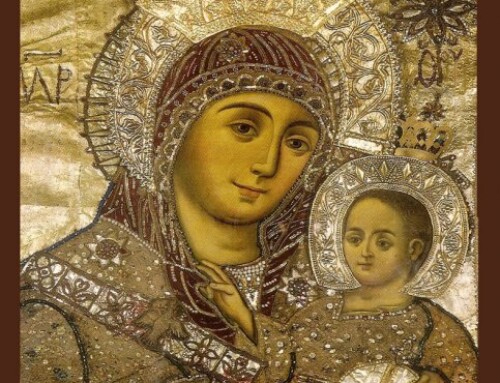Word Magazine September 1961 Page 5-6
EXPOSITION OF THE LORD’S PRAYER
By the Late Father Seraphim Nassar
Spring Valley, Illinois
The Lord’s Prayer is an example and rule of prayer, which is the lifting of our minds to God. It is the prayer which our Lord Jesus Christ taught to His apostles, and through them to all the faithful. It is divided into three parts: an introduction, seven petitions and a conclusion. Of these petitions three pertain to God and four to us.
ON THE INTRODUCTION TO THE LORD’S PRAYER
“Our Father Who art in Heaven.”
In this introduction we learn that we have a universal Father, omnipresent, but in a special sense in heaven. We call God Father by the power of faith in Christ, and according to the grace of regeneration. Wherefore says John the Divine: “But as many as received him, to them gave he the right to become children of God, even to them that believe on his name: Who were born, not of blood, nor of the will of the flesh, nor of the will of man, but of God.” (JOHN 1:12 and 13). We also call God, Our Father that we may remember that we are all brethren, and not despise the least of people and those of lowly stations.
We have learned to call God in heaven, not because He dwells in heaven only, for He is not contained in space and ineffable, but that we may abandon all things earthly and perishable, and that we may lift our minds to things heavenly, eternal and divine. Said the divine Chrysostom: “Attend to the subtlety of this speech . . . how He counsels us.” It may also be said that God dwells in heaven because that is the all holy place, in which shines the splendor of the richness of His grace and His comprehensive benevolences. For this is heaven called God’s throne. (Ps. 103:19). God dwells, too, in the hearts of those who love Him, as the Savior said: “If a man love me, he will keep my word: and my Father will love him, and we will come unto him, and make our abode with him.” (JOHN 14:23)
ON THE FIRST PETITION
“Hallowed Be Thy Name.”
The means by which God’s name may be hallowed, and consequently glorified, is our good works, which have a way of moving people to glorify Him. And for this the Lord said: “Even so let your light shine before men; that they may see your good works, and glorify your Father who is in heaven.” (MATT. 5:16). And the opposite is true when our works do not correspond to faith, for then they become a reason for blasphemy of God’s name as the Apostle said: “For the name of God is blasphemed among the Gentiles because of you.” (ROM. 2:24).
Verily God’s name is holy, yea all-holy. “For God is holy, all-holy and the most holy of the holies.” Hence the Seraphim offer Him this praise, crying in never-silent voices, Holy, holy, holy, the Lord of Sabaoth; the heaven and earth are full of His glory.” What is meant, therefore. by our saying, “Hallowed be thy name,” is not that we offer God holiness that does not this word “Hallowed” is used instead of glorify. Wherefore, we learn by this to lead a life adorned with virtue, that when men see it, they may glorify our heavenly Father.” (Chrysostom in his discourse entitled, “Conduct according to God.”)
ON THE SECOND PETITION
“Thy Kingdom Come.”
By the kingdom of God is meant not only the kingdom to come, but also the present one. We, therefore, pray to God not only to enjoy the heavenly kingdom, but also that He reign in us, and put away sin from us. This is what the Apostle referred to when he said: “Let not sin therefore reign in your mortal body, that ye should obey the lusts thereof.” (Ro. 6:12). And Chrysostom said: “For the tribulations of the body tyrannize over us. And for this reason we are in need of the kingdom of God, lest sin reign in our mortal body and we obey it in its lusts, nor offer our members as instruments of oppression for sin. And we learn, too, not to indulge in the present life, but disdain the present things and aspire for the heavenly ones as things that remain; that we seek that eternal heavenly kingdom.” (Chrysostom in above Discourse.)
ON THE THIRD PETITION
“Thy Will Be Done on Earth As It Is in Heaven.”
Having planted in our hearts the love of things to come, and the desire for the heavenly kingdom, the Savior taught us to say, “Thy will be done on earth as it is in heaven.” And that is because we are ignorant of what is suitable and useful for us; and often do we imagine the apparent good as bliss, and the tribulations as a great calamity. Wherefore He commanded us to say, “Thy will be done,” meaning that as the holy angels in heaven do the will of God, so on earth may men do also.
ON THE FOURTH PETITION
“Give Us This Day Our Daily Bread.”
Having prayer first for the heavenly things, He commanded us to pray for the necessary nourishment, and that in accordance with the Lord’s commandment: “Seek ye first his kingdom, and his righteousness; and all these things shall be added unto you.” (MATT. 6:33). And He commanded us to pray for the daily bread, which is sufficient for the maintenance of our substance and growth, sufficient and necessary for nourishment nor for indulgence and luxuries. And for whatever exceeds our necessities we should be grateful to God; and if we lose it we should not sorrow or be angered. He commanded us to pray for the daily bread this day lest we be over-anxious for the things of the future, as the Savior said: “Be not therefore anxious for the morrow: for the morrow will be anxious for itself. Sufficient unto the day is the evil thereof.” (MATT. 6:34). And the divine Chrysostom said: “Leave anxiety for the morrow for Him, as the beatified David said, ‘Cast thy burden upon the Lord, and he will sustain thee.’” (Ps. 55:27) (Chrysostom in above Discourse.)
We should also understand by the “daily bread” the bread of the soul, which is the body of the Lord and His blood. For the Lord’s flesh is meat indeed, and His blood is drink indeed.” (JOHN 6:55). And the glorified Savior said: “Man shall not live by bread alone, but by every word that proceedeth out of the mouth of God.” (MATT. 4:4).
ON THE FIFTH PETITION
“Forgive Us Our Trespasses As We Forgive
Those Who Trespass Against Us”
Mankind loving God, since He knows that it is impossible for us not to fall in sin, as long as we are human beings and putting on mortal flesh, has taught us to say, “Forgive us our trespasses, etc.” And from this petition we learn not to boast of our good deeds, and that we should not be overwhelmed by despair and despondency if we fall into sin after baptism: to be adorned with gentleness and compassion, and to hear malice against none who sin against us. For God does not forgive us our sins except that we, too, forgive our brother’s sins. How otherwise, when He had declared: “For if ye forgive men their trespasses, your heavenly Father will also forgive you. But if ye forgive not men their trespasses, neither will your Father forgive your trespasses..” (MATT. 6:14 and 15). And when we pray we must withdraw from all enmity and wrath, and if possible, be in peace and love with all. “If thou art offering thy gift at the altar, go first and be reconciled to thy brother, and then come and offer thy gift.” (MATT. 5:23 and 24). And if our enemy does not accept the reconciliation, or if he is absent, it suffices to have the reconciliation and love in the heart before God the investigator of hearts and the knower of secrets, the watcher over all. And we should remember that the Apostle said: “If it be possible, as much as in you lieth, be at peace with all men.” (Ro. 12:18). And it may be noted here that our sins are called in the Lord’s Prayer, according to the Greek idiom, debts. For they place man under responsibility as the debts does.
ON THE SIXTH PETITION
“And Lead Us Not into Temptation.”
The temptations in the world are many and varied. Some of them have their source in our body, and some in the world or men, and some come from Satan. And by temptation is meant here a great tribulation or struggle in which we come upon the danger of the loss of faith, or fall precipitously in some horrible iniquity. Wherefore we petition God to guard us from temptation. And by this petition the signs of humility are manifest. As for the saying, “Lead us not into temptation,” it means, permit not that we be led into temptation. It does not mean, Send not temptations to us. For this is not vouchsafed us while we are in this life. Rather we pray that the temptations be not too heavy lest we fall under their weights, humbled. However, often does God permit that we fall in such temptations, either for the remission of our sins, or to reveal our magnanimity, that we may become exemplars of patience and faith. In this day did God tempt Abraham when He asked him to offer Isaac as a sacrifice: and He tempted Job that his patience may become an example for patience and endurance. Similarly did He tempt many. Albeit, God never tempts His servants in the way of deceit, for deceitful temptations only come from Satan. (MATT. 4:1 and II COR. 2:11) from the world, (Prov. 1:10 and 11) or from the flesh. This is confirmed by the words of the Apostle James: “Let no man say when he is tempted, I am tempted of God; for God cannot be tempted with evil, and he himself tempteth no man: But each man is tempted, when he is drawn away by his own lust, and enticed.” (JAMES 1:13 and 14). The weapons with which we overcome these temptations are: faith, (EPH. 6:16) subjection to God, (JAMES 4:7) and prayer (MATT. 26:31). Nor should it escape us that we pray of God not to permit that we be led into temptations such as these, but once we are led we should be strengthened and ask for divine assistance and succor from above. And it behooves us to remember always the Savior’s words: “Watch and pray, that ye enter not into temptation.” (MARK 14:38).
ON THE SEVENTH PETITION
“But Deliver Us from Evil.”
In this petition we pray that we be made safe from all evil, and especially from the evil of sin amid the intrigues of the Evil one or Satan, and his wicked insinuations.
Note also that the word “Evil” appears in John (17:15) and II Thes. (3:3) and it denotes either sin or the Evil one, i.e. Satan who, “as a roaring lion, walketh about, seeking whom He may devour.” (PETER 5:8).
ON THE CONCLUSION OF THE LORD’S PRAYER
“For Thine is the Kingdom, the Power and Glory, For Ever and Ever. Amen.”
By this conclusion God is praised and glorified. It means: Let these come to pass which we petitioned for in our prayers. Or it may also mean that Thine are the kingdom, power and glory unto ages of ages, that Thou art the powerful and glorified King always.


